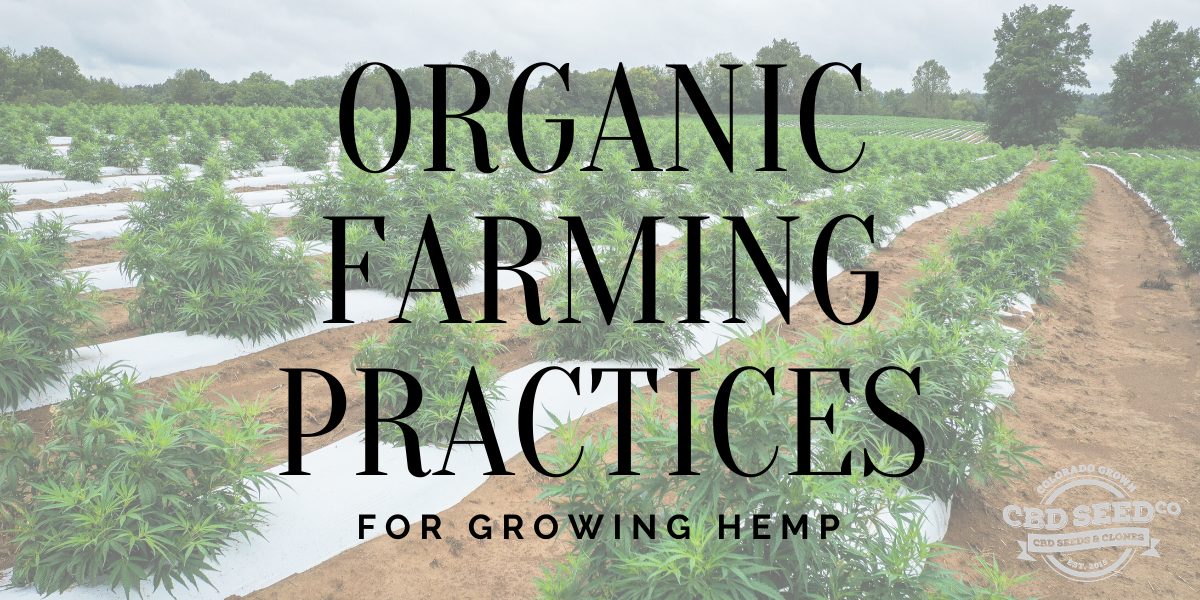Organic Farming Practices for Growing Hemp

The Best Farming Equipment for Hemp Cultivation
February 11, 2020
New Study: Hemp Cleans Toxic Soil While Producing Clean CBD Flower
February 11, 2020The organic farming industry as a whole is a booming business in the US and across the world. The word organic itself, however, is a bit of a misnomer and can lead to false claims and confusion. Something organic is, by definition, made from living, carbon-based matter–which is pretty much everything. In popular vernacular these days, the meaning has shifted when applied to the foods we consume to mean
“of, relating to, yielding, or involving the use of food produced…without the employment of chemically formulated fertilizers, growth stimulants, antibiotics, or pesticides” -Miriam Webster
This definition then puts constraints on exactly what organic hemp is and is not for that matter. Furthermore, to have truly organic hemp you must adhere to the standards of the National Organic Program or NOP. These standards can be found in full here, but below we have an overview.
Organic Hemp Farming Has Two Basic Land Requirement
The first requirement is that the land must not contain any of the prohibited substances on this list for at least three years.
What may surprise you is–not all pesticides are banned for use with organic hemp. Some that use natural ingredients like plant extracts, insect pathogens, and fungal derivatives, are allowed and a few “low-risk” synthetic pesticides may be used.
The second requirement is that the land used to grow the hemp must have strictly defined boundaries AND a buffer zone to prevent contamination with prohibited substances from the surrounding area. This is important to know since many farms are right next to one another, which could lead to accidental cross-over.
Organic Hemp Soil Requirements
There are a number or requirements for organic soil which you can find here. Below we listed a few to give you an idea of what proper organic soil practices look like.
Tillage practices that minimize soil erosion
Non-chemical methods of soil management (this includes crop rotation, cover crops)
Raw manure application that does not contaminate the soil, plants, or water
No sewage or sludge use
Organic Hemp Seed Requirements
The soil requirements for organic crops growing are a bit complicated, but it boils down to–you must use organic seeds whenever possible. If no organic seed can be found you may use non-organic. However, with hemp this is pretty cut and dry since–there are plenty of organic seeds readily available. So, if you want to grow organic hemp, especially CBD hemp, you really need to buy organic seeds.
Organic Hemp Pest and Disease Standards
Any farmer, hemp or otherwise, know that pests and disease are incredibly hard to battle. The truth is–organic farming makes it that much harder. This is because you may not use synthetic biologics to aid you. Happily, alternative practices are profuse and include:
- Crop rotation
- Sanitation methods that remove the habitat of pests
- Choosing plants resistant to pest and disease
- Introduction of predators of pests species
- Introduction of parasites to battle disease and pest organisms
- Lures and traps to ward off wildlife
- Mulch (natural or synthetic), mowing, flame or heat to remove weeds
The rules even allow for some biologicals (synthetic and natural) to be used. However, you must document these substances and why it was necessary to use them. You must have also tried the methods above first. The rules are much more in-depth in extensive, so to fully understand them you can find more information here.
CBD Seed Co for Certified Organic Seeds
This is just an overview on organic hemp farming practices in the US. Follow any of the informational links above to find out how you can make your hemp farm certified organic. At CBD seed company, we sell a variety of organic seeds that we use in our own high-quality products–you can check them out here. Contact us directly if you have any questions on organic hemp farming, organic hemp seeds or organic CBD products.


